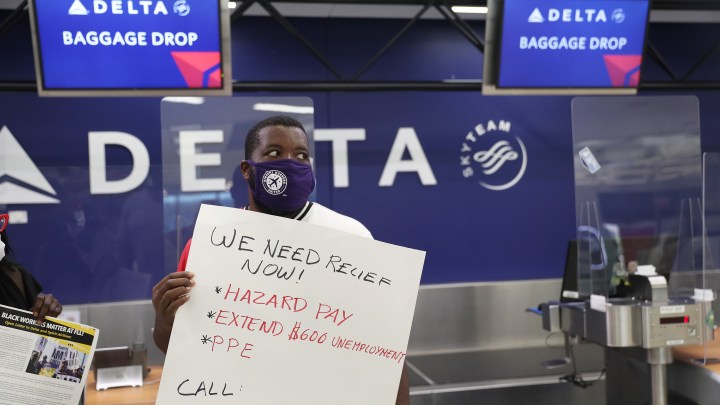
Where’s the safety net for laid-off workers?
Where’s the safety net for laid-off workers?

Today is the end of the fiscal year for many companies, and with the economy still bottled up for the most part because of COVID-19 precautions, a lot of big companies are laying off workers in order to cut costs.
Disney announced Tuesday it’s laying off 28,000 workers. Airline workers are bracing for mass layoffs come Thursday. We learned Wednesday that Shell is cutting up to 9,000 jobs.
When the first round of layoffs happened as a result of shutdowns back in March, Congress passed the CARES Act to put money in Americans’ pockets — and it helped.
But this time around, people are wondering where that safety net is.
At about 2 p.m. Tuesday, Inez Guzman said she got an email from her employer. She’s a housekeeper at the Disneyland Hotel in Anaheim, California.
“Well, it pretty much just told us that, you know, they were going to lay off 28,000 people,” she said.
She’s been furloughed since March 13, which means up until now, Disney’s been paying for her health insurance, and she’s been collecting unemployment. But she’s worried about what she’ll do if her job is gone.
“We can barely pay our bills,” Guzman said. “And, you know, with my family, I have a family of seven, and I’m barely making it.”
Jim Sullivan, who studies poverty and teaches economics at the University of Notre Dame, said Congress seems to be banking on the labor market somehow recovering quickly. But that could be wishful thinking.
“If the labor market doesn’t improve significantly over the next few months, and your unemployment rates remain as high as they are — which is much higher than they were at the beginning of the year — we’re going to surely see poverty continue to rise,” he said.
Sullivan said current data is already showing that many families are struggling to get enough to eat, much less pay their bills. Heidi Shierholz at the Economic Policy Institute said it’s ultimately up to Congress to step in and help.
“If it doesn’t, this will go down as one of the biggest unforced errors in the economy that I’ve ever seen,” she said. “And it will just mean the working people, the working families of this country, will just suffer enormously and needlessly.”
She said the Fed is doing what it can to incentivize Americans to spend, but what families really need is more relief money.
There’s a lot happening in the world. Through it all, Marketplace is here for you.
You rely on Marketplace to break down the world’s events and tell you how it affects you in a fact-based, approachable way. We rely on your financial support to keep making that possible.
Your donation today powers the independent journalism that you rely on. For just $5/month, you can help sustain Marketplace so we can keep reporting on the things that matter to you.


















